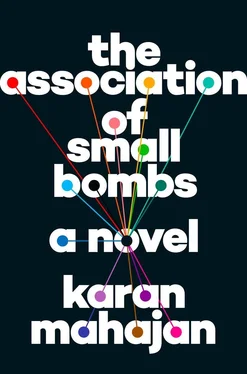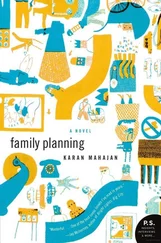From the jammed roads — the crowds gathering there and pooling around a stopped bus, pointing — he could tell something exceptional had happened. Then a woman who could have been his grandmother said, “A bomb just burst here.”
A bomb. He had survived, witnessed, walked through a bomb blast. He couldn’t believe it. He had heard of bomb blasts before, of course — they were always in the news and had been recently because of the 1996 World Cup; some of the matches scheduled in Sri Lanka had been canceled because of bomb threats by the LTTE, an organization his father called “ruthless.” “In this country, they’re always accusing Muslims of terrorism,” Sharif had said, bringing his soft paws together — he was a fat man with unemotional features that were childlike, even pitiable, in their conviction—“when the most dangerous terrorists have been Hindus and Sikhs. You know who blew up Rajiv Gandhi? Hindus. A woman from the LTTE, the same group that set off the bombs in Colombo that so scared the Australian team. You know who killed Rajiv’s mother, Indira? Her sardar bodyguards. So when people say—” He shook his head. “It makes me angry when the proof is right there, the statistics are there, and the journalists won’t consult them.”
“Gandhi-ji’s assassin was also a Hindu.”
“Yes,” said Sharif. “We’re very lucky that that was the case. Your Nana-ji was in Aligarh when it happened.” Sharif’s grandfather had been a freedom fighter, an associate of Sir Syed Ahmed Khan; Sharif was proud of this fact, and loved telling Mansoor about it. Mansoor, though not interested, liked sending his father into raptures of open-ended conversation so he could daydream about the girls he loved in school. He was, he felt, a tragic romantic hero. He stared at girls shyly and gave them poems that he claimed to have written but that he had copied from his mother’s thick Emily Dickinson anthology; she had an MA in English from LSR and had been a theater actress and a counselor at Air Force Bal Bharati School before becoming a housewife.
How far he’d come, in the space of a few hours, from that home life!
Mansoor, tired, bleeding, walked on Ring Road, past a mandi with its nauseating smell of rotten, overripe fruit and covering of blue tarpaulin. After spending a few minutes on the jammed road outside the market, listening to people speculate about the bomb, whether it had been planted by Muslims — listening, in other words, to people intent on gossiping about the tragedy rather than heeding a victim passing before them — he had made the decision to walk home. Of course, he only knew the city from the insides of an air-conditioned car. How far was home from here? Fifteen, twenty minutes? The streets with their bracing angles scrolled and zagged in his mind’s eye, unfurling at whatever speed the vantage of the car provided.
By the time he was outside the mandi, he was exhausted, and worried about how he would navigate the thundering pitiless straight-shooting traffic on the main road. His body tensed; he held his bleeding wrist, disgusted by the stickiness, and walked on.
It became easy to avoid oncoming traffic; he pressed close to the edge of the mandi, often standing in the way of cursing, bell-ringing cyclists, and he only had to jump out of the way when a cow browsed toward him (he had once been knocked down in Bhogal by a bull, losing a milk tooth, and that had been the end of his mandi-going ways).
Dusk deepened, coloring the sky a polluted pink; birds wheeled restlessly overhead, as if waiting for rush hour to end so they could head down to collect their spoils. Mansoor ambled past a school on his left; crossed between hawkers smoking peanuts in black vessels on the sidewalk; dodged cakes of cow dung; and wondered, with a half smile, if his parents would be impressed with his presence of mind, his ability to navigate the city after the shock of the explosion. Then the smile fell away as he remembered Tushar and Nakul. What had happened to them? Were they — dead? And why had he run? If he were to go back and play the thoughts running through his head at the moment he had left them, they would have been something like this: They’re brothers. They can take care of themselves. Or: Didn’t I tell them I didn’t want to go to the market? Why did they force me?
Men and women and kids and dogs passed by, unaware of who he was, why he was bleeding, why he stood in his upper-class shorts alone on a city sidewalk. Their faces were sweaty and private in the Petromax lights switched on by the street carts.
“Sir,” Mansoor said to one man in his twenties, but Mansoor was too feeble and the man passed him by.
“Uncle,” he said to another man who walked by, licking an ice cream. And this man stopped and studied Mansoor with eyes that were either surprised or glaring. He was middle-aged and paunchy and mustachioed and his tongue shot out to keep the sides of the softie from melting.
“Talk,” the man said.
Mansoor told him what had happened: the blast, the market, the boys, the walk.
Perhaps because he lacked another option, the paunchy man with the unblinking, ambling eyes kept licking the sides of his ice cream, sculpting it into a manageable shape with his tongue.
“Where do you live?” he asked.
“South Ex,” Mansoor said.
“In part one or two?”
“Two.” How was this relevant?
“Your parents are at home?”
“Yes, uncle.”
“And your friends’ mummy and daddy?”
“At home also, uncle.”
He shook his head seriously. Then he said, “Will you have some ice cream?”
The man was much more at ease with the ice cream out of his hands. Taking a hankie out of his pocket, he wiped his face and then his forehead. “There’s a PCO nearby. We can phone from there.”
As they walked in the direction Mansoor had come from, Mansoor having gratefully demolished the ice cream (even as he dreaded the germs he’d imbibed), the man said, “You’re badly hurt, yaar. Maybe we should go to a hospital first. My car is parked nearby. Come with me.”
Till this point, Mansoor had been happy to walk with the man, but as soon as talk of the car came up, he recoiled. “No need, uncle. Let’s make the phone call.”
“But, son, the car’s right here. In the time we make the call we can get you treated.”
“But, uncle, my friends are in the market.”
“Let me open my car.”
Mansoor wanted to tell him about the traffic jam, but something came over him and he ran.
“Son!” the man shouted.
He ran fast, kicking up dirt with his heels; when he stopped, only a little beyond where he’d first spied the man, he was winded and ashamed. He looked over his shoulder to see if he was being pursued. He felt he’d done the right thing. He had grown up in a city full of stories about kidnappings and disappearances; had heard from his mother about how one maid dressed up her ward, a two-year-old, in rags, blackened his face, and took him out on the street to beg. The parents of the child were always wondering why the child was so tired when they came back home; then one day the mother was driving on the road and — Ah!
Mansoor walked with urgency. He did not want to be pursued by the fat kidnapper. He cursed himself for not having asked a lady for help.
His house was still at least a kilometer away and he’d made little progress. Heavy black smog sat over the road. A stranded ambulance screamed in traffic. Beyond, blinking, he could make out Moolchand flyover, and beyond that, the mirage of South Extension — smoke and haze and the familiar congested approach to home.
________
The Ahmeds were convinced their son was dead. Leaving AIIMS hospital, where Afsheen’s cousin promised to keep vigil, they headed to Moolchand hospital. One by one, in this manner, they made a desperate tour of the hospitals of South Delhi. Afsheen was sick and crying throughout. “Be positive,” Sharif said, as he watched his high-strung but sweet wife dissolving. “There’s no objective evidence that anything has happened.” He was at the steering wheel of the car. “He might be at someone’s house.”
Читать дальше












